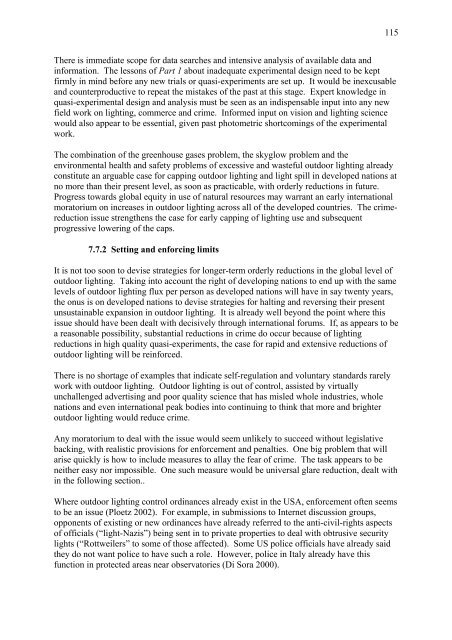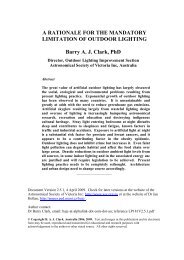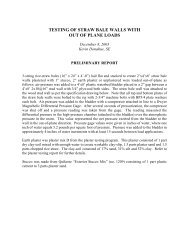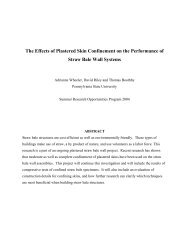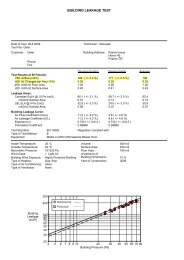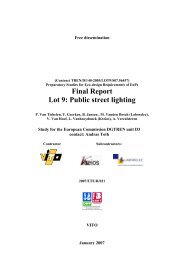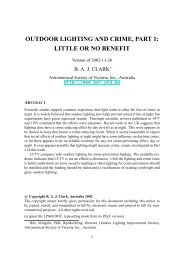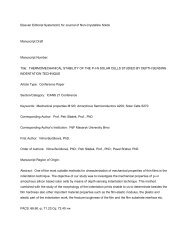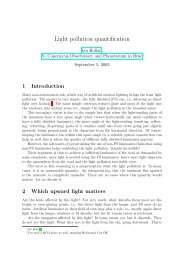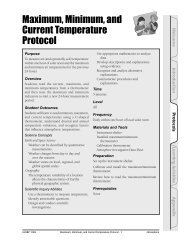Outdoor Lighting and Crime - Amper
Outdoor Lighting and Crime - Amper
Outdoor Lighting and Crime - Amper
You also want an ePaper? Increase the reach of your titles
YUMPU automatically turns print PDFs into web optimized ePapers that Google loves.
There is immediate scope for data searches <strong>and</strong> intensive analysis of available data <strong>and</strong><br />
information. The lessons of Part 1 about inadequate experimental design need to be kept<br />
firmly in mind before any new trials or quasi-experiments are set up. It would be inexcusable<br />
<strong>and</strong> counterproductive to repeat the mistakes of the past at this stage. Expert knowledge in<br />
quasi-experimental design <strong>and</strong> analysis must be seen as an indispensable input into any new<br />
field work on lighting, commerce <strong>and</strong> crime. Informed input on vision <strong>and</strong> lighting science<br />
would also appear to be essential, given past photometric shortcomings of the experimental<br />
work.<br />
The combination of the greenhouse gases problem, the skyglow problem <strong>and</strong> the<br />
environmental health <strong>and</strong> safety problems of excessive <strong>and</strong> wasteful outdoor lighting already<br />
constitute an arguable case for capping outdoor lighting <strong>and</strong> light spill in developed nations at<br />
no more than their present level, as soon as practicable, with orderly reductions in future.<br />
Progress towards global equity in use of natural resources may warrant an early international<br />
moratorium on increases in outdoor lighting across all of the developed countries. The crimereduction<br />
issue strengthens the case for early capping of lighting use <strong>and</strong> subsequent<br />
progressive lowering of the caps.<br />
7.7.2 Setting <strong>and</strong> enforcing limits<br />
It is not too soon to devise strategies for longer-term orderly reductions in the global level of<br />
outdoor lighting. Taking into account the right of developing nations to end up with the same<br />
levels of outdoor lighting flux per person as developed nations will have in say twenty years,<br />
the onus is on developed nations to devise strategies for halting <strong>and</strong> reversing their present<br />
unsustainable expansion in outdoor lighting. It is already well beyond the point where this<br />
issue should have been dealt with decisively through international forums. If, as appears to be<br />
a reasonable possibility, substantial reductions in crime do occur because of lighting<br />
reductions in high quality quasi-experiments, the case for rapid <strong>and</strong> extensive reductions of<br />
outdoor lighting will be reinforced.<br />
There is no shortage of examples that indicate self-regulation <strong>and</strong> voluntary st<strong>and</strong>ards rarely<br />
work with outdoor lighting. <strong>Outdoor</strong> lighting is out of control, assisted by virtually<br />
unchallenged advertising <strong>and</strong> poor quality science that has misled whole industries, whole<br />
nations <strong>and</strong> even international peak bodies into continuing to think that more <strong>and</strong> brighter<br />
outdoor lighting would reduce crime.<br />
Any moratorium to deal with the issue would seem unlikely to succeed without legislative<br />
backing, with realistic provisions for enforcement <strong>and</strong> penalties. One big problem that will<br />
arise quickly is how to include measures to allay the fear of crime. The task appears to be<br />
neither easy nor impossible. One such measure would be universal glare reduction, dealt with<br />
in the following section..<br />
Where outdoor lighting control ordinances already exist in the USA, enforcement often seems<br />
to be an issue (Ploetz 2002). For example, in submissions to Internet discussion groups,<br />
opponents of existing or new ordinances have already referred to the anti-civil-rights aspects<br />
of officials (“light-Nazis”) being sent in to private properties to deal with obtrusive security<br />
lights (“Rottweilers” to some of those affected). Some US police officials have already said<br />
they do not want police to have such a role. However, police in Italy already have this<br />
function in protected areas near observatories (Di Sora 2000).<br />
115


